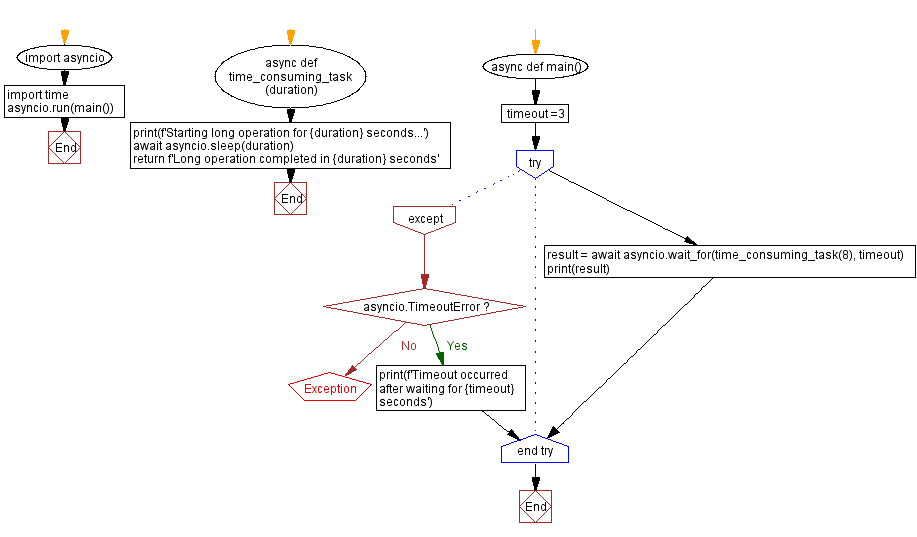Setting timeouts for asynchronous operations in Python using asyncio.wait_for()
7. Async Timeout with wait_for
Write a Python program that implements a timeout for an asynchronous operation using asyncio.wait_for().
Sample Solution:
Code:
import asyncio
import time
async def time_consuming_task(duration):
print(f'Starting long operation for {duration} seconds...')
await asyncio.sleep(duration)
return f'Long operation completed in {duration} seconds'
async def main():
timeout =3
try:
result = await asyncio.wait_for(time_consuming_task(8), timeout)
print(result)
except asyncio.TimeoutError:
print(f'Timeout occurred after waiting for {timeout} seconds')
asyncio.run(main())
Output:
Starting long operation for 8 seconds... Timeout occurred after waiting for 3 seconds
Explanation:
In the above exercise -
- asyncio.wait_for() takes an awaitable (coroutine) and a timeout in seconds.
- It waits for the coroutine to complete or raises asyncio.TimeoutError if timeout is exceeded.
- The program await the wait_for() call to perform the wait.
- The try/except block catches the potential TimeoutError.
- If timeout occurs, we handle it accordingly in the except block.
- If coroutine completes within timeout, result is returned as normal.
Flowchart:

For more Practice: Solve these Related Problems:
- Write a Python program to implement an asynchronous function that simulates a long-running task and enforces a timeout using asyncio.wait_for.
- Write a Python script to use asyncio.wait_for to set a timeout on a coroutine that fetches data, printing an error message if the operation times out.
- Write a Python function that wraps a coroutine in asyncio.wait_for with a specified timeout and handles asyncio.TimeoutError by returning a default value.
- Write a Python program to test an async operation with a timeout using asyncio.wait_for, then print whether the operation completed or timed out.
Go to:
Previous: Handling task cancellation with asyncio.CancelledError in Python.
Next: Simulating a producer-consumer scenario with asyncio queues in Python.
Python Code Editor :
What is the difficulty level of this exercise?
Test your Programming skills with w3resource's quiz.
